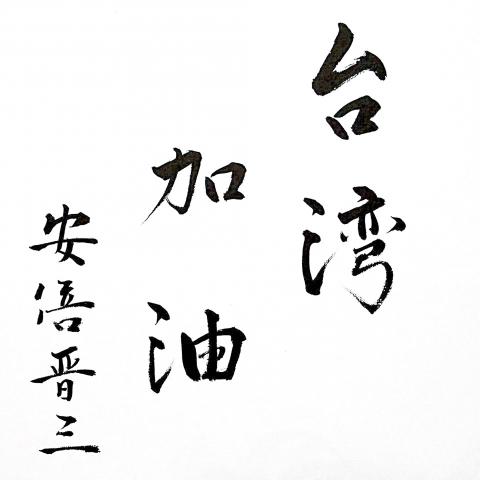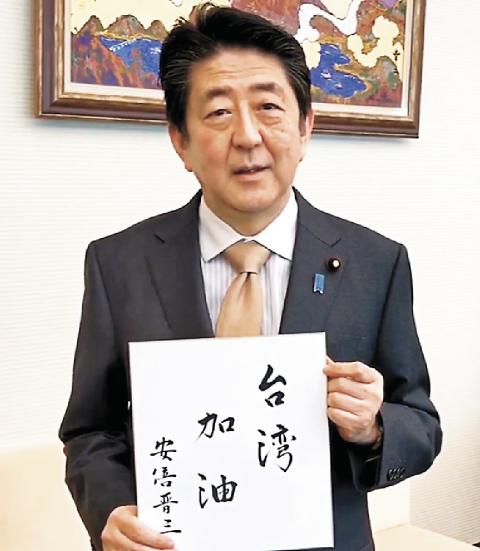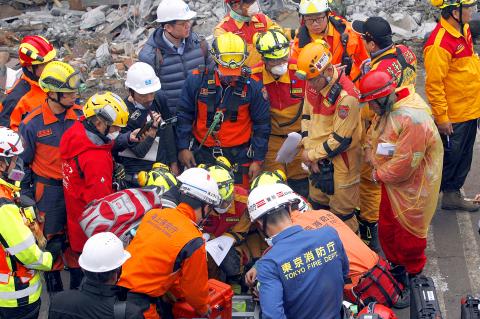The first international search-and-rescue team from Japan has arrived to help with efforts in Hualien after a magnitude 6.0 earthquake struck on Tuesday night, Ministry of Foreign Affairs spokesperson Andrew Lee (李憲章) said yesterday.
“The government of Japan has answered our requests for aid and has sent a team of seven experts and two advanced scanners,” Lee said.
Japanese Prime Minister Shinzo Abe wrote a personal letter to President Tsai Ing-wen (蔡英文) expressing the nation’s condolences over the earthquake and said that the Japanese team has been dispatched to help in the continuing search-and-rescue operation.

Screen grab from the Prime Minister of Japan ’s Facebook account
Officials from the Japanese Ministry of Foreign Affairs, the Japan International Cooperation Agency, the Tokyo Fire Department, the Tokyo Police Department and the Japan Coast Guard’s Tokyo branch are also coming to Taiwan, Lee said, adding that two officials from the Taiwan-Japan Relations Association and the Japan-Taiwan Exchange Association would accompany the group to facilitate communications.
The search-and-rescue team arrived at Taipei International Airport (Songshan airport) at 12:30pm and was flown directly to Hualien.
Lee thanked to the Japanese government on behalf of the Ministry of Foreign Affairs for dispatching a professional team and its high-tech equipment in such a short time.

Screen grab from the Prime Minister of Japan ’s Facebook account
Japanese Minster of Foreign Affairs Taro Kono also telephoned Minster of Foreign Affairs David Lee (李大維) to express his concern and condolences.
As of 10am yesterday, representatives from 25 countries, including diplomatic allies the Holy See, Belize, Haiti, Nicaragua, Saint Lucia, the Dominican Republic and Guatemala, arrived in Taiwan to express their support and condolences.
Tsai thanked world leaders for their concern and condolences on her official social media sites.

Photo: AP
“Taiwan is grateful to the many offers of assistance & support coming from around the world. Although relief efforts in Hualien are sufficient, your warmth & kindness have been felt by people of Taiwan,” she wrote on Twitter.
Tsai also responded to Abe’s Facebook account, which offered condolences and showed a picture of his calligraphy.
“A true friend during such difficult times... Our friendship and values will be manifested with humanitarian aid,” Tsai tweeted in Japanese.
Netizens alleged that the original phrasing of Abe’s letter had been changed due to Chinese pressure.
The letter, posted on the Japanese Prime Minister Residence’s account, initially addressed Tsai as, “President,” but the title was dropped less than two hours later.
Content on site are considered official governmental documents.
Netizens praised Japan for “having the guts” to address Tsai by her official title, a source said.
Japan-Taiwan Exchange Association Department of General Affairs Director Michi Kakizawa said he was not sure why the letter was changed, adding that the association delivered the letter from “Prime Minister Abe to President Tsai.”

Taiwan is stepping up plans to create self-sufficient supply chains for combat drones and increase foreign orders from the US to counter China’s numerical superiority, a defense official said on Saturday. Commenting on condition of anonymity, the official said the nation’s armed forces are in agreement with US Admiral Samuel Paparo’s assessment that Taiwan’s military must be prepared to turn the nation’s waters into a “hellscape” for the Chinese People’s Liberation Army (PLA). Paparo, the commander of the US Indo-Pacific Command, reiterated the concept during a Congressional hearing in Washington on Wednesday. He first coined the term in a security conference last

Prosecutors today declined to say who was questioned regarding alleged forgery on petitions to recall Democratic Progressive Party (DPP) legislators, after Chinese-language media earlier reported that members of the Chinese Nationalist Party (KMT) Youth League were brought in for questioning. The Ministry of Justice Investigation Bureau confirmed that two people had been questioned, but did not disclose any further information about the ongoing investigation. KMT Youth League members Lee Hsiao-liang (李孝亮) and Liu Szu-yin (劉思吟) — who are leading the effort to recall DPP caucus chief executive Rosalia Wu (吳思瑤) and Legislator Wu Pei-yi (吳沛憶) — both posted on Facebook saying: “I

Sung Chien-liang (宋建樑), who led efforts to recall Democratic Progressive Party (DPP) Legislator Lee Kun-cheng (李坤城), was released on bail of NT$80,000 today amid outcry over his decision to wear a Nazi armband to questioning the night before. Sung arrived at the New Taipei District Prosecutors’ Office for questioning in a recall petition forgery case last night wearing a red armband bearing a swastika, carrying a copy of Adolf Hitler’s Mein Kampf and giving a Nazi salute. Sung left the building at 1:15am without the armband and covering the book with his coat. Lee said today that this is a serious

A mountain blaze that broke out yesterday morning in Yangmingshan National Park was put out after five hours, following multi agency efforts involving dozens of fire trucks and helicopter water drops. The fire might have been sparked by an air quality sensor operated by the National Center for High-Performance Computing, one of the national-level laboratories under the National Applied Research Laboratories, Yangmingshan National Park Headquarters said. The Taipei City Fire Department said the fire, which broke out at about 11am yesterday near the mountainous Xiaoyoukeng (小油坑) Recreation Area was extinguished at 4:32pm. It had initially dispatched 72 personnel in four command vehicles, 16